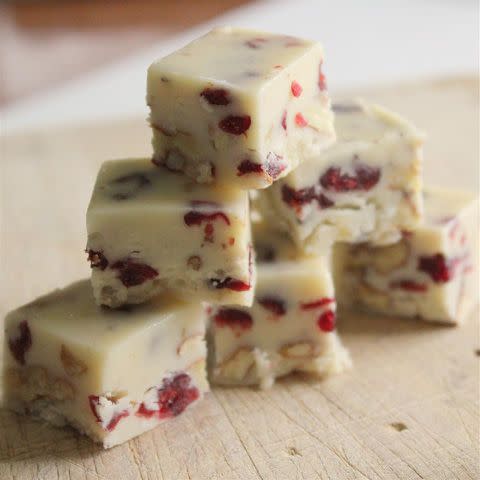Nutmeg 101: What It Is and How to Use It
Everything you need to know about this spice before baking season.

When you think of fall spices or holiday baking, you're thinking nutmeg whether you know it or not. But beyond seasonally specific dishes, nutmeg is an excitingly versatile spice that's as excellent to use in everyday cooking as it is in baking.
What Is Nutmeg?
Despite what the name might imply, nutmeg isn't a nut, but a seed. (Those with nut allergies need not banish it from their homes.) What is commonly known as nutmeg is a ground spice made from the seed of a nutmeg tree, an evergreen tree native to Indonesia. The seed resides inside the golden, apricot-like fruit from the tree.
Related: Pumpkin Spice Cookie Recipes Full of Cozy Fall Flavor
A bit of an overachiever, this tree actually produces two spices – nutmeg and mace. Nutmeg is the inner seed and mace is the red, lacey stuff covering the outer casing of the seed. The spice in our cabinets and on shelves in stores is a dark brown, fragrant and finely ground transformation of the seed.
Where Does It Come From?
The nutmeg tree might be native to Indonesia, but it grows in tropical climates everywhere. When the fruit from this evergreen tree ripens, it splits open to reveal the inner aril, which is covered in the red, lace layer that, when ground, becomes mace. Once that's removed, the aril is left out in the sun to dry gradually over 6-8 weeks, allowing the seed to separate from its hard outer layer.
Nutmeg dates back to the 1st century, when it was considered high currency for trade. In fact, nutmeg was so prized that it caused a war. The Dutch took over the Banda Islands in an effort to monopolize the nutmeg trade, which resulted in a battle, then eventually the establishment of the Dutch East India Company.

Get the recipe: White Cranberry Walnut Nutmeg Fudge
What Does Nutmeg Taste Like?
Nutmeg has a slight sweetness, but the most fitting descriptors include warming, peppery, earthy, cozy, or even slightly spicy (referencing the warm notes rather than heat). Nutmeg is akin to many holiday candles that tote woodsy scents.
Ground nutmeg is also included in a few spice blends such as pumpkin pie spice, ras el hanout, garam masala, and Jamaican jerk seasoning.
Related: What Is Mace?
Whole vs. Ground Nutmeg
Both whole nutmeg and ground are easily purchased at any grocery store. Grating the seed fresh is, well, fresher. It'll taste cleaner and be more fragrant and pungent than pre-ground, store-bought nutmeg. (It's honestly ridiculous how much bigger the flavor is from the freshly grated stuff.) If using it whole, you'll need a micro plane or a specific nutmeg grater.
Grating a nutmeg seed is a bit of a task, however, it takes a good bit of time and patience to get even ¼ teaspoon for a coffee cake or other baked goods. It's absolutely worth the effort, but no one will fault you for opting for the convenience of the ground stuff. If all you're doing is dusting the top of a beverage with it, then by all means, grate away.
How to Cook with Nutmeg
Nutmeg is part of a unique club of spices that lends itself to the savory as well as the sweet, its warmth and depth elevating whatever it touches. Most recognizably, bechamel utilizes it in a subtle, yet decadently delicious way.
Nutmeg also boasts a rich history in both African and Caribbean cuisine. Try nutmeg on roasted squash or in a butternut squash soup, in a vegetable gratin, an alfredo, mashed potatoes, curry, or Bolognese. Dust it over sweet potatoes, add it to a chicken rub, or use it to perk up a pan of mac and cheese.
Related: Essential Ingredients That Every Baker Needs
All sorts of pies, custard tarts, cookies, and cakes call for the use of this beautiful spice, especially over the holidays. Even if it isn't in the recipe, you can add a bit to any dish that calls for cinnamon alongside it.
Freshly grated is the perfect finishing touch on top of whipped cream or beverages like lattes, cappuccinos, and eggnogs, not to mention other cocktails like flips or mulled wine.
How to Store Nutmeg
Like other spices, it's best to store nutmeg, whole or ground, in an airtight container, far away from heat, light, or moisture.
Ground nutmeg will stay fresh about 6 months. Most of us keep our spices much longer than that, and it won't be bad or bad for you, but it will certainly be less potent. Whole nutmeg won't ever go bad. If you only use it every now and then, it's best to buy it whole.
Related:
Read the original article on All Recipes.

